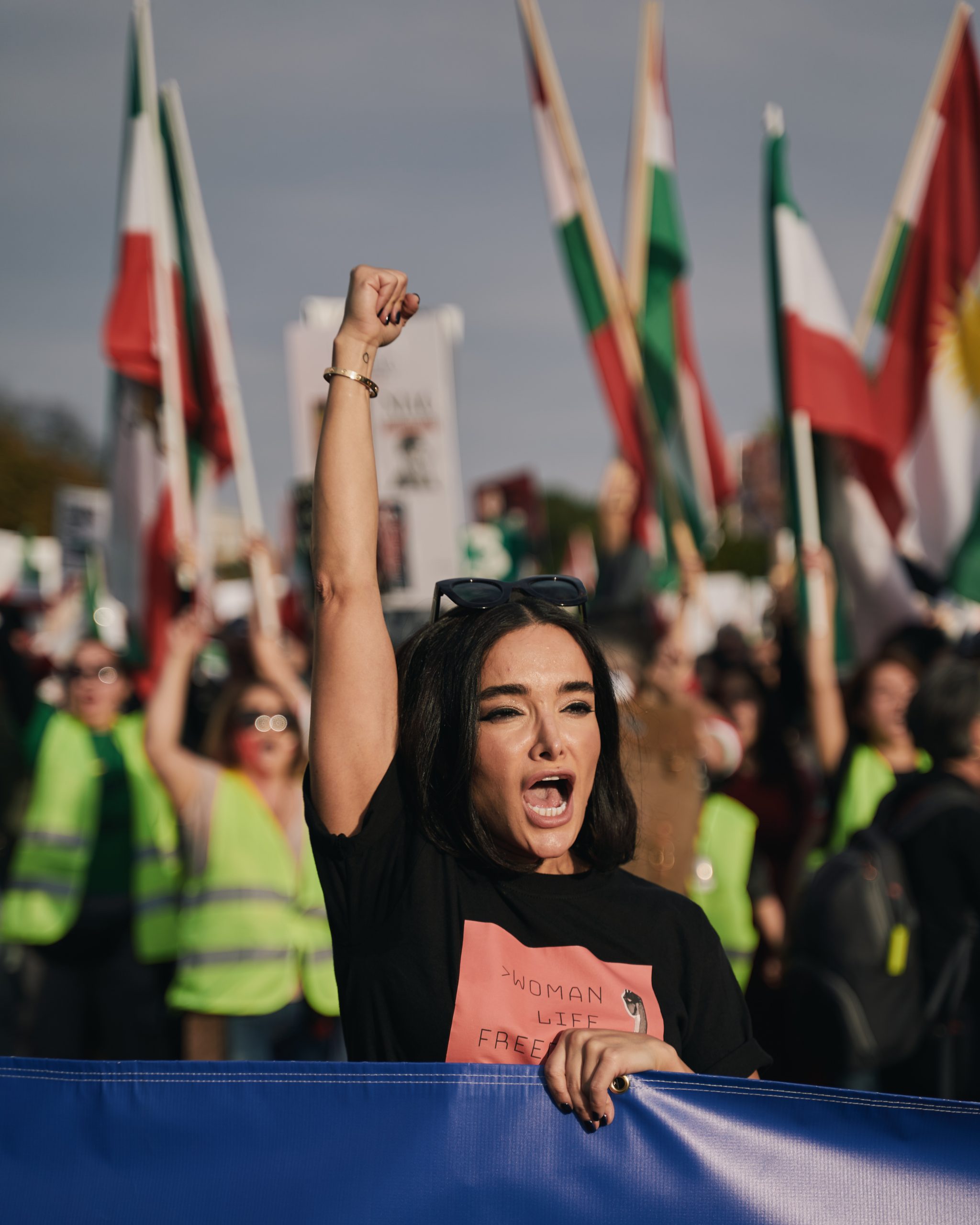This article first appeared in Volume 53, Issue 4 of our print edition of Index on Censorship, titled Unsung Heroes: How musicians are raising their voices against oppression. Read more about the issue here. The issue was published on 12 December 2024.
In around 2009, Golazin Ardestani was preparing to go on stage in Tehran. The venue was sold out. She and her university classmates had been through months of rehearsals for their traditional concert and had followed all the rules: they had their songs cleared by the Ministry of Culture and Islamic Guidance, the lead singer was male, the musicians would be seated on the floor and everyone was dressed appropriately, including the correct hijab protocols. And yet, as Ardestani – who goes by the stage name Gola – walked towards the stage, she was told: “No, you can’t perform with them. No female musician can go on stage tonight.”
She stood at the side of the stage and watched her friends perform without her, clutching the formal permission papers which should have allowed her to sing, and which had been wilfully ignored. This is just one of the heartbreaking memories she has of being a female musician in Iran.
A few years later, Ardestani left Iran for good. Now in her 30s, she is based between Europe and the USA, where she creates music that speaks out against the regime. In 2018, she founded her own record label, Zan Recordings, so that she could finally release music on her own terms.
Ardestani was born in Isfahan, in Iran. She taught herself to yodel as a child and grew up in a house filled with a mix of the traditional Persian music favoured by her parents, and the Iranian and Western pop smuggled in by her older siblings, whose musical preferences were inspired by their desire for freedom.
“My teenage years were full of those stolen moments listening to forbidden songs on satellite,” she told Index over email. “Music, and especially female performers, gave me a sense of freedom that was completely absent on our heavily censored government TV.”
Growing up, Gola had never seen a woman on an Iranian stage. At age 19, fed up with trying to conform to traditional norms and still being prevented from singing, she joined some friends and a group of three sisters to create Iran’s first girl band, Orchid.
They wanted to challenge the narrative of female singers being “provocative”, and to resist patriarchal and authoritarian forces. Behind their music was a deep understanding of the history of Iranian music from before the Islamic revolution of 1979, when female singers like Googoosh and Qamar-ol-Moluk Vaziri had been celebrated and were free to perform to mixed audiences.
Orchid was only allowed to perform for female audiences, who had to remain seated. Gestures or movements that could be interpreted as dancing were strictly forbidden. The performers themselves had to avoid showing emotion on stage.
“There were female morality police at the end of each row, watching us and the audience,” Ardestani recalled.
The memory of those performances, in front of thousands of women, is still vivid.
“It was such a powerful experience that I remember making a promise to myself that night: that I would sing, I would sing solo, and I would one day sing for a mixed audience,” she said. “I held onto this vision of a day when our fathers, brothers, husbands and sons could feel proud of the women on stage.”
Whilst in Iran, Ardestani was arrested three times by the morality police, experiences which she said shaped her music and her determination to keep fighting.
The first occasion was when she was just 16, when she was arrested because her hijab wasn’t covering the front of her hair. She sat terrified in a cell and sang to distract herself. A woman shouted at her: “Shut up, close your mouth, shut your ugly voice!”
The last time she was arrested was particularly brutal and was due to the clothes she was wearing. “As they were about to push me into the van, I put on my fighting face, but chaos quickly ensued,” she said. A crowd began to form, and she hit something hard, breaking her arm. With the situation out of control, the police’s superior told her to go home in a taxi.
“All of this because of my ripped jeans, even though I was wearing a long manto [overcoat] and a scarf covering my hair.”
Ardestani considers herself lucky to have escaped alive. Under similar circumstances, Mahsa “Jina” Amini died in custody in September 2022, the moment that sparked the Woman, Life, Freedom uprising.

Iranian singer Golazin Ardestani demonstrating in Washington DC. Photo by Nathan Napolitano
Before leaving Iran in 2011 both to perform without persecution, and to study for a master’s in music psychology in London, Ardestani made a final attempt to plead her case and gain permission to record an album.
“I had to trick my way through the system just to get my foot in the door of the Department of Direction, where the man who granted permissions for male singers worked. But when I finally met him, he wouldn’t even look at me, staring at the floor as he spoke,” she said. She was told that Iran didn’t need a Céline Dion.
Ardestani knew then there was no coming back. “Once I started singing freely, I would lose my home forever,” she said. On the day she left, after Norouz (Persian New Year) in 2011, she decided she would dedicate everything to fighting for change.
“I promised myself that my music would carry the voices of those who can’t be heard,” she said. “There was no way for me to be fully myself as a musician, as a singer or even as a woman. They controlled every aspect of my voice, my body, my agency.”
She knows that she cannot return, and is confident that if she did, she would be arrested and charged with Mofsed fel-Arz, or “spreading corruption on earth”, due to her open challenges to what she calls Iran’s “fabricated religious theocracy”. This charge could carry a death sentence.
The songs she has finally had the freedom to create include Haghame, meaning “It’s My Right”, which is about the freedom to choose whether or not to wear the hijab. Another, Khodavande Shoma, translates to “Your God”, and includes the lyrics: “Your god is sick, it seems – a sick, dangerous criminal. Your religious beliefs, death, and destruction. Your prayers are for murder and blood.”
For female musicians in Iran, freedom is still out of reach. Many women rely on underground scenes, Ardestani told Index, but this comes with its own risks. Posting performances on social media can also lead to arrests, intimidation and the charge of Mofsed fel-Arz.
And censorship does not always respect borders. At a concert in Canada in 2023, designed to support the Woman, Life, Freedom movement, Ardestani was told she could not sing Khodavande Shoma, because the organisers believed it was “attacking people’s religion”. This, she said, is not what the song is about. Rather she is “confronting the twisted version of religion that the Islamic regime has created”.
“I am an Iranian woman fighting for freedom and, specifically, for women’s freedom of choice and speech. Yet here I was, outside of Iran, being told by an organiser – of a concert for freedom, no less – that I couldn’t sing a song in a free country,” she said.
She told the male Iranian organisers that she would sing that song, or not sing at all. They relented.
For every performance Ardestani gives, another song in Iran is silenced. She often posts on social media about the plight of imprisoned Iranian musicians. She condemned the arrest of Zara Esmaeili, who often sang covers of international pop hits in public with her hair uncovered. One social media video showed Esmaeili performing Amy Winehouse’s Back to Black. She was arrested on 25 July 2024, and it is believed that she has not been heard from since.
Ardestani is a huge admirer of Iranian rapper Toomaj Salehi, who won an Index Freedom of Expression Award in 2023. He was first arrested in 2022, and after being detained multiple times and tortured, he was charged with “corruption on earth”, jailed and given the death sentence. The death sentence was dropped after campaigning from prominent musicians and human rights organisations including Index, and Salehi was released in early December.
“It’s unimaginable that a musician, simply expressing himself through lyrics, could be sentenced to death for his art,” Ardestani said. “Iranian music is powerful and resilient; it’s the heartbeat of a people who have been silenced in many other ways. Each song is a form of resistance, a declaration of our existence and our hope.”
As to why Salehi and other musicians are targeted, she has a strong theory: “They know the power of a good song, the potential of meaningful lyrics and the way music can unite people to inspire change.”
For Ardestani now, everything is about fighting for freedom for all – not just in Iran, but globally. She describes music as a way to transform personal struggles into a collective moment. In another of her songs, Betars Az Man, or Fear Me, she sings:
“The butterfly is fleeing its cocoon.
Fear me, as I am that butterfly.
Fear me, as freedom is my voice.”
In her upcoming song Zaloo, she says she will offer her vision for ending theocracy in Iran – a musical call to action. For Ardestani, music is a form of rebellion. And as she told Index, far from being afraid herself: “Those who wish to silence me should be the ones who are afraid.”






